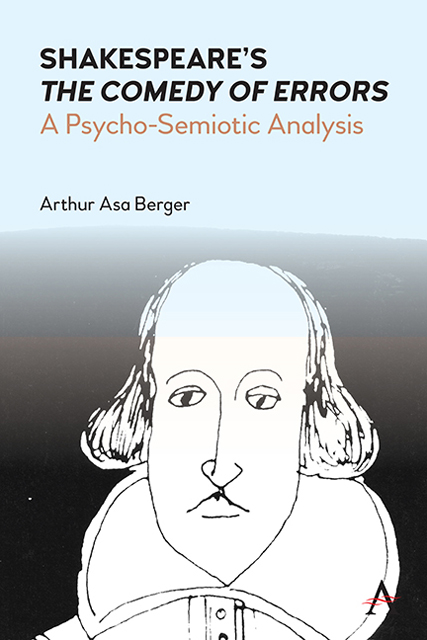5 - The Comedy of Errors
Published online by Cambridge University Press: 10 January 2023
Summary
The Persons of the Play
SOLINUS, Duke of Ephesus
EGEON, a merchant of Syracuse, father of the Antipholus twins
ANTIPHOLUS OF EPHESUS
ANTIPHOLUS OF SYRACUSE
DROMIO OF EPHESUS
DROMIO OF SYRACUSE
ADRIANA, wife of Antipholus of Syracuse
LUCIANA, her sister
LUCE, Adriana's kitchen maid, also known as NELL
BALTHAZAR, a merchant
ANGELO, a goldsmith
DOCTOR PINCH, a schoolmaster
FIRST MERCHANT, friend to Antipholus of Ephesus
SECOND MERCHANT, to whom Angelo owes a debt
EMILIA, an Abbess at Ephesus
COURTESAN
JAILER
OFFICERS
Synopsis of The Comedy of Errors
Act I
Because a law forbids merchants from Syracuse to enter Ephesus, elderly Syracusian trader Egeon faces execution when he is discovered in the city. He can only escape by paying a fine of a thousand marks. He tells his sad story to Solinus, Duke of Ephesus. In his youth, Egeon married and had twin sons. On the same day, a poor woman without a job also gave birth to twin boys, and he purchased these as slaves to his sons. Soon afterward, the family made a sea voyage and was hit by a tempest. Egeon lashed himself to the main-mast with one son and one slave, and his wife took the other two infants. His wife was rescued by one boat, Egeon by another. Egeon never again saw his wife or the children with her. Recently his son Antipholus, now grown, and his son's slave Dromio left Syracuse to find their brothers. When Antipholus did not return, Egeon set out in search of him. The Duke is moved by this story and grants Egeon one day to pay his fine. That same day, Antipholus arrives in Ephesus, searching for his brother. He sends Dromio to deposit some money at The Centaur, an inn. He is confounded when the identical Dromio of Ephesus appears almost immediately, denying any knowledge of the money and asking him home to dinner, where his wife is waiting. Antipholus, thinking his servant is making insubordinate jokes, beats Dromio of Ephesus.
Act II
Dromio of Ephesus returns to his mistress, Adriana, saying that her “husband” refused to come back to his house, and even pretended not to know her. Adriana, concerned that her husband's eye is straying, takes this news as confirmation of her suspicions.
- Type
- Chapter
- Information
- Shakespeare’s The Comedy of ErrorsA Psycho-Semiotic Analysis, pp. 65 - 88Publisher: Anthem PressPrint publication year: 2022

